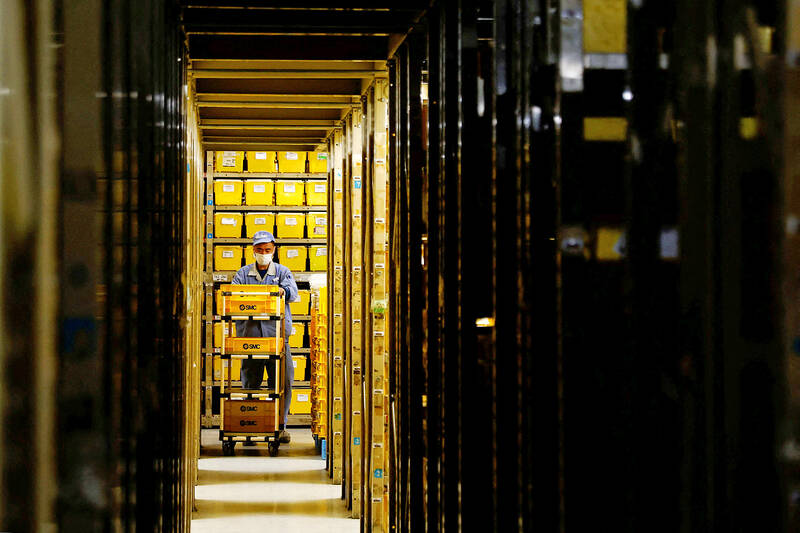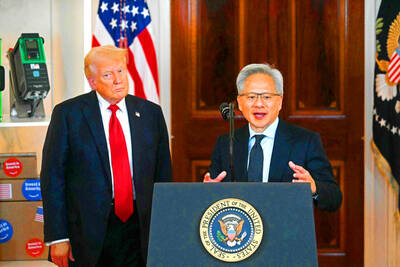The World Bank on Tuesday slashed its growth forecasts for this year to levels teetering on the brink of recession for many countries as the effects of central bank rate hikes intensify, Russia’s war in Ukraine continues and the world’s major economic engines sputter.
The development lender said it expected global GDP growth of 1.7 percent this year, the slowest pace outside the 2009 and 2020 recessions since 1993.
In its previous Global Economic Prospects report in June last year, the bank had forecast global growth at 3 percent this year.

Photo: Reuters
It forecast global growth next year to pick up to 2.7 percent — below the 2.9 percent estimate for last year — and said that average growth for the 2020-2024 period would be less than 2 percent — the slowest five-year pace since 1960.
The bank said that major slowdowns in advanced economies, including sharp cuts to its forecast to 0.5 percent for both the US and the eurozone, could foreshadow a new global recession less than three years after the last one.
“Given fragile economic conditions, any new adverse development — such as higher-than-expected inflation, abrupt rises in interest rates to contain it, a resurgence of the COVID-19 pandemic or escalating geopolitical tensions — could push the global economy into recession,” the bank said in a statement accompanying the report.
The bleak outlook would be especially hard on emerging market and developing economies, as they struggle with heavy debt burdens, weak currencies and income growth, and slowing business investment that is forecast at a 3.5 percent annual growth rate over the next two years — less than half the pace of the past two decades, it said.
“Weakness in growth and business investment will compound the already devastating reversals in education, health, poverty and infrastructure, and the increasing demands from climate change,” World Bank president David Malpass said in a statement.
China’s growth fell to 2.7 percent last year, its second-slowest pace since the mid-1970s after 2020, as “zero COVID-19” restrictions, property market turmoil and drought hit consumption, production and investment, the World Bank report said.
It predicted a rebound to 4.3 percent for this year, but that is 0.9 percentage points below the June forecast due to the severity of COVID-19 disruptions and weakening external demand.
The World Bank said that some inflationary pressures started to abate as last year drew to a close, with lower energy and commodity prices, but warned that risks of new supply disruptions were high, and elevated core inflation might persist.
This could cause central banks to respond by raising policy rates by more than currently expected, worsening the global slowdown, it added.
The report was released as the World Bank’s board this week is expected to consider a new “evolution road map” for the institution to vastly expand its lending capacity to address climate change and other global crises.
The plan would guide negotiations with shareholders, led by the US, for the biggest revamp in the bank’s business model since its creation at the end of World War II.

Taiwan Semiconductor Manufacturing Co (TSMC, 台積電) last week recorded an increase in the number of shareholders to the highest in almost eight months, despite its share price falling 3.38 percent from the previous week, Taiwan Stock Exchange data released on Saturday showed. As of Friday, TSMC had 1.88 million shareholders, the most since the week of April 25 and an increase of 31,870 from the previous week, the data showed. The number of shareholders jumped despite a drop of NT$50 (US$1.59), or 3.38 percent, in TSMC’s share price from a week earlier to NT$1,430, as investors took profits from their earlier gains

AI TALENT: No financial details were released about the deal, in which top Groq executives, including its CEO, would join Nvidia to help advance the technology Nvidia Corp has agreed to a licensing deal with artificial intelligence (AI) start-up Groq, furthering its investments in companies connected to the AI boom and gaining the right to add a new type of technology to its products. The world’s largest publicly traded company has paid for the right to use Groq’s technology and is to integrate its chip design into future products. Some of the start-up’s executives are leaving to join Nvidia to help with that effort, the companies said. Groq would continue as an independent company with a new chief executive, it said on Wednesday in a post on its Web

CHINA RIVAL: The chips are positioned to compete with Nvidia’s Hopper and Blackwell products and would enable clusters connecting more than 100,000 chips Moore Threads Technology Co (摩爾線程) introduced a new generation of chips aimed at reducing artificial intelligence (AI) developers’ dependence on Nvidia Corp’s hardware, just weeks after pulling off one of the most successful Chinese initial public offerings (IPOs) in years. “These products will significantly enhance world-class computing speed and capabilities that all developers aspire to,” Moore Threads CEO Zhang Jianzhong (張建中), a former Nvidia executive, said on Saturday at a company event in Beijing. “We hope they can meet the needs of more developers in China so that you no longer need to wait for advanced foreign products.” Chinese chipmakers are in

POLICY REVERSAL: The decision to allow sales of Nvidia’s H200 chips to China came after years of tightening controls and has drawn objections among some Republicans US House Republicans are calling for arms-sale-style congressional oversight of artificial intelligence (AI) chip exports as US President Donald Trump’s administration moves to approve licenses for Nvidia Corp to ship its H200 processor to China. US Representative Brian Mast, the Republican chairman of the US House Committee on Foreign Affairs, which oversees export controls, on Friday introduced a bill dubbed the AI Overwatch Act that would require the US Congress to be notified of AI chips sales to adversaries. Any processors equal to or higher in capabilities than Nvidia’s H20 would be subject to oversight, the draft bill says. Lawmakers would have